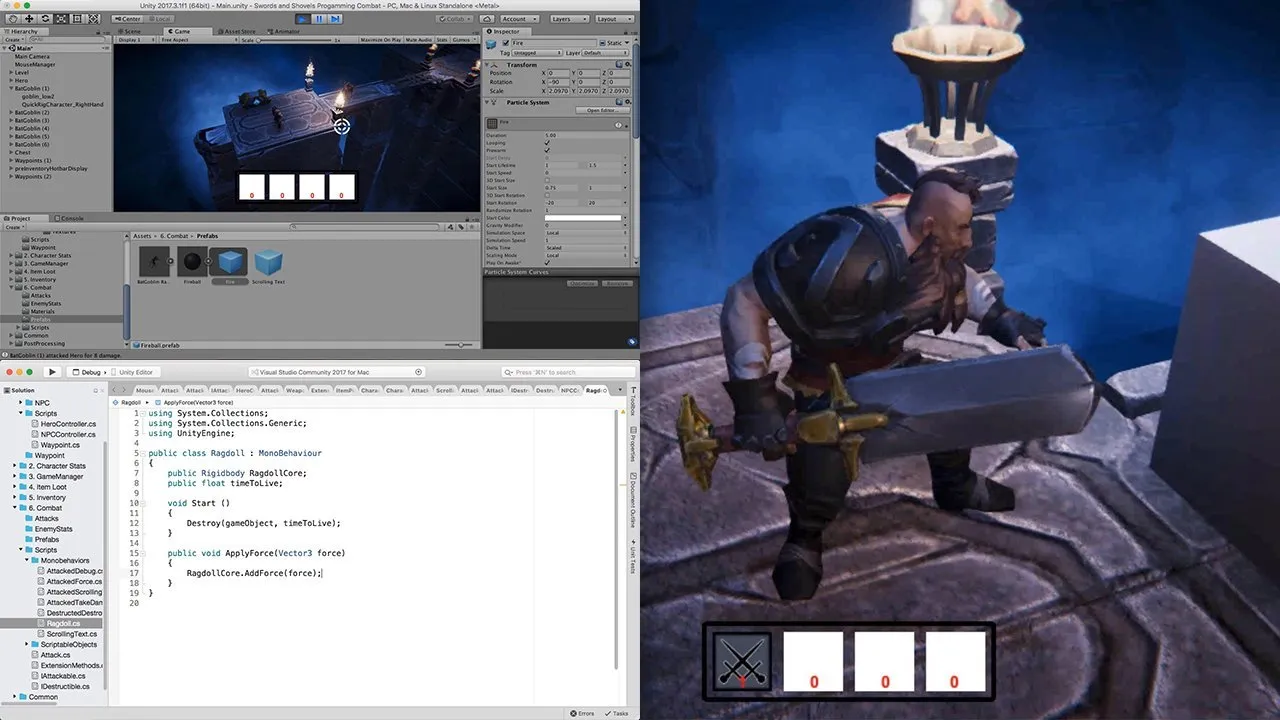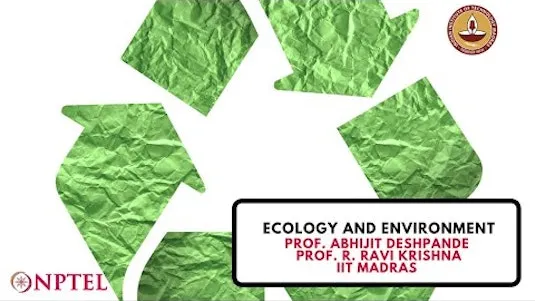
Ecology: from cells to Gaia 
This course provides an introduction to the principles of evolution and ecology, exploring major ideas and results and their implications for biology and environmental sciences. Recent advances have made these fields more exciting than ever, offering evidence that can be used to inform the toolkit of all biologists and educated citizens. ▼
ADVERTISEMENT
Course Feature
![]() Cost:
Cost:
Free
![]() Provider:
Provider:
Coursera
![]() Certificate:
Certificate:
Paid Certification
![]() Language:
Language:
English
![]() Start Date:
Start Date:
28th Feb, 2022
Course Overview
❗The content presented here is sourced directly from Coursera platform. For comprehensive course details, including enrollment information, simply click on the 'Go to class' link on our website.
Updated in [March 06th, 2023]
This course, Ecology: from Cells to Gaia, provides an overview of the principles of evolution and ecology for citizens and students interested in studying biology and environmental sciences. It covers major topics such as fundamental principles of ecology, how organisms interact with each other and their environment, evolutionary processes, population dynamics, communities, energy flow and ecosystems, human influences on ecosystems, and the integration and scaling of ecological processes through systems ecology. Learners will gain an understanding of major ecological concepts, identify the techniques used by ecologists, gain an overview of local and global environmental issues, and examine individual, group and governmental activities important for protecting natural ecosystems. The course also covers the theoretical and practical issues involved in ecology and evolution, conducting surveys and inventories in ecology, analyzing the information gathered, and applying their analysis to ecological and conservation problems. Learners should have a general background in biology and a good understanding of English in order to be successful in this course.
[Applications]
The application of this course can be seen in the development of strategies for conservation and management of natural resources, the development of sustainable practices, and the understanding of the effects of human activities on the environment. Additionally, the course can be used to develop an understanding of the principles of ecology and evolution, and to develop skills in data collection, analysis, and interpretation. Finally, the course can be used to develop an understanding of the importance of ecological research and its implications for society.
[Career Paths]
1) Environmental Scientist: Environmental scientists are responsible for studying the environment and its effects on humans, animals, and plants. They use their knowledge of ecology, biology, chemistry, and other sciences to identify and assess environmental problems, develop solutions, and advise policy makers. Environmental scientists are also involved in developing and implementing environmental regulations and policies. As environmental issues become more pressing, the demand for environmental scientists is expected to increase.
2) Conservation Biologist: Conservation biologists are responsible for studying and protecting endangered species and their habitats. They use their knowledge of ecology, biology, and other sciences to identify and assess environmental problems, develop solutions, and advise policy makers. Conservation biologists are also involved in developing and implementing conservation plans and policies. As the need to protect endangered species and their habitats increases, the demand for conservation biologists is expected to increase.
3) Ecological Engineer: Ecological engineers are responsible for designing and implementing solutions to environmental problems. They use their knowledge of ecology, engineering, and other sciences to identify and assess environmental problems, develop solutions, and advise policy makers. Ecological engineers are also involved in developing and implementing environmental regulations and policies. As environmental issues become more pressing, the demand for ecological engineers is expected to increase.
4) Environmental Educator: Environmental educators are responsible for educating the public about environmental issues and their solutions. They use their knowledge of ecology, biology, and other sciences to identify and assess environmental problems, develop solutions, and advise policy makers. Environmental educators are also involved in developing and implementing environmental education programs and policies. As environmental issues become more pressing, the demand for environmental educators is expected to increase.
[Education Paths]
1) Bachelor of Science in Ecology: This degree program focuses on the study of the interactions between organisms and their environment. It covers topics such as population dynamics, community ecology, conservation biology, and global change. Students will learn about the principles of ecology, the effects of human activities on ecosystems, and the methods used to protect and restore natural habitats. This degree is becoming increasingly popular as the need for environmental protection and conservation grows.
2) Master of Science in Environmental Science: This degree program focuses on the study of the environment and its components, such as air, water, and soil. It covers topics such as environmental chemistry, environmental law, and environmental policy. Students will learn about the effects of human activities on the environment, the methods used to protect and restore natural habitats, and the principles of environmental management. This degree is becoming increasingly popular as the need for environmental protection and conservation grows.
3) Doctor of Philosophy in Ecology: This degree program focuses on the study of the interactions between organisms and their environment. It covers topics such as population dynamics, community ecology, conservation biology, and global change. Students will learn about the principles of ecology, the effects of human activities on ecosystems, and the methods used to protect and restore natural habitats. This degree is becoming increasingly popular as the need for environmental protection and conservation grows.
4) Master of Science in Conservation Biology: This degree program focuses on the study of the conservation of biodiversity and the management of natural resources. It covers topics such as population ecology, conservation genetics, and conservation planning. Students will learn about the principles of conservation biology, the effects of human activities on ecosystems, and the methods used to protect and restore natural habitats. This degree is becoming increasingly popular as the need for environmental protection and conservation grows.
Course Syllabus
Welcome to the Course
In this module, after an introduction about the meaning and a brief history of Ecology, we will see how plant and animal adapt and interact with their environment and how these interactions changes life histories and populations. Then we will focus on interspecific competition and we will understand that the avoidance of competition is a more common pattern in ecology than pure competition.Module 1. The Scope of Ecology
In this module, we will talk about agonistic and foraging interactions between species (such as predation, herbivory and parasitism) and mutualistic interactions (such as symbiosis, commensalism, endosymbiosis, etc.). Then we will see how these interactions influence the evolutionary ecology of species and their diversity. In the last lesson of this module we will analyse the energy flux and biogeochemical cycles that keep alive Earth’s ecosystems and the whole biosphere (e.g. Gaia).Module 2. The Ecosystem
In this module, we will discuss some fundamental ecological processes, such as those must be present in any Gaian planet. We will consider the Gaian effects of parasites and predators, biodiversity and hypercycles and we will see how these processes regulates our planet. Finally, we will consider the global ecological role of biomass, photosynthesis and carbon sequestration.Module 3. Energy in Ecological Systems
In this final module, we will explore the possibility of a new ecology by exploring the concept of sustainability, evaluating the human impacts on ecosystems and providing some solutions for nature conservation. Finally, we will see how to organise a citizen science event, called Bio-blitz, which can improve the scientific knowledge of our planet and, at the same time, rise the ecological awareness of citizens.Module 4. Population Ecology and Evolution
This module allows you to learn how to organise a Bio-blitz – an intensive biological investigation, which aims to record all the species living within a designated area, comprising groups of specialists supported by non-experts.Course Provider

Provider Coursera's Stats at AZClass
Discussion and Reviews
0.0 (Based on 0 reviews)
Explore Similar Online Courses

Swords and Shovels: Combat System

Magical Photomontage in Photoshop: Creating Visual Metaphors

Python for Informatics: Exploring Information

Social Network Analysis

Introduction to Systematic Review and Meta-Analysis

The Analytics Edge

DCO042 - Python For Informatics

Causal Diagrams: Draw Your Assumptions Before Your Conclusions

Whole genome sequencing of bacterial genomes - tools and applications

South Asian Religions & Ecology

MGPE-014: Gandhi: Ecology and Sustainable Development


Start your review of Ecology: from cells to Gaia